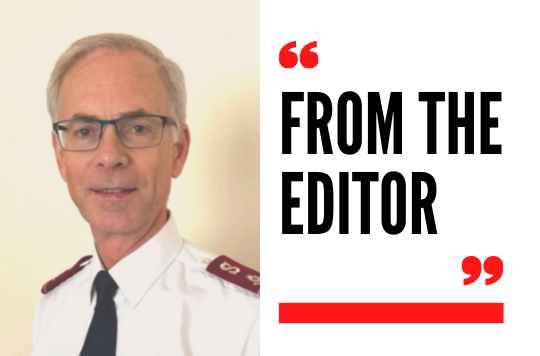Article of the week: An Army at war
13 November 2021
Marc Muller describes the work of L’Armée du Salut during the First World War
DURING the First World War, L’Armée du Salut mobilised to bring relief and comfort, first to refugees and the wounded then to soldiers in transit and behind the front line.
In September 1914 much of the population of Belgium and the north of France fled. And so The Salvation Army’s war work began. There were isolated initiatives at first, because it seemed unlikely that the war would last. Nevertheless, the territorial commander for France and Belgium made Army premises available and offered its services to the authorities. Locally, Salvationists responded spontaneously.
In some places, The Salvation Army accommodated refugees or welcomed passing soldiers. In others, visits were made to the wounded in military health services. The 100-bed hostel in Lyons became a temporary hospital. Salvation Army officers who had been nurses volunteered to treat and take care of the wounded in hospitals. And Salvationists answered spiritual questions and offered help and support to men and families marked by separation, suffering and grief.
As the war continued the Army moved towards more sustainable and established action. During the winter of 1914–15, social centres sent clothes and parcels to soldiers on the front lines. The Ministry of War appreciated this ‘Old Linen League’, but Salvationists were unaccustomed to long, costly action and the Army’s traditional activities suffered.
As the task grew heavier, most men were mobilised. The canteens of the British Salvation Army would inspire the work of L’Armée du Salut. At Le Havre, an officer transformed the hall into a room for reading and correspondence. Other hostels followed their example.
Meetings and recreational evenings took place and, depending on circumstances, there was even a canteen. Few religious services were organised for troops, but Salvationists were especially attentive to those for whom faith seemed to be the answer to their daily misery. Every night, a hundred Poilus – the equivalent of the British Tommy – on leave or in transit through the Gare de l’Est in Paris were able to stay in the hostel in the Rue de Chabrol.
From 1916 onwards the Soldiers Hostels increased in number and soup kitchens opened in Paris. The law of 30 May 1916 gave a legal framework and resources to this war effort and to all the Army’s other activities.
Colonel AIbin Peyron became the territorial commander in 1917 and, on 25 December, he organised a meeting in the basement of the Krug company in Reims with the approval of the military’s joint chiefs of staff. The next day he wrote: ‘The bombing was incessant; nature seemed to be shedding tears over the tortured city... This Christmas Day the snow covered her with a fine unsullied shroud, the Christmas tree flickered under the vaults of a champagne cellar... There were a hundred people there, mainly soldiers.’
Soldiers Hostels began to be established in the military zone behind the front. In collaboration with the military authorities, The Salvation Army obtained authorisation to remain in this zone and advance at the same time as the troops. The Soldiers Hostels became mobile. In a few hours, a large tent was pitched in the corner of a field, folding tables and benches were taken out of a van and, as the Army’s En Avant! periodical reported in October 1918, the Poilus ‘were able to taste a cup of hot chocolate and sign the pre-printed cards that would take eagerly awaited news to their families’.
The work was not without risk. In June 1918 several Army hostels had to be evacuated due to the German counter-offensive.
On 11 November 1918 the First World War ended. French soldiers no longer had to fight, but they remained mobilised and the Soldiers Hostels lasted until 1923. The 24th one was opened in Strasbourg, Alsace, which had again become a French region. This programme had satisfied hundreds of thousands of users as well as the military command. The supreme allied commander, Maréchal Foch, expressed his gratitude to The Salvation Army ‘for what you did for our soldiers’.
From then on The Salvation Army was recognised and appreciated throughout France. It was the French Salvation Army’s first great project since the work started in the country in 1881. Others were to follow but, ironically, it was during a time of war that the Army learnt how to organise and implement this great endeavour.
MARC IS CSM, PARIS CORPS

From the editor
An early look at the editor's comment

Salvationist
Salvationist is a weekly magazine for members and friends of The Salvation Army

The War Cry
The War Cry is packed with features, reviews, mouth-watering recipes, puzzles and more.